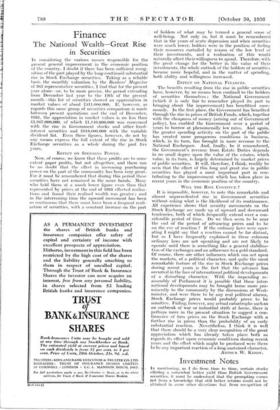The National Wealth—Great Rise in Securities
Finance
IN considering the various causes responsible for the present general improvement in the economic position of the country, I doubt if there has been sufficient recog- nition of the part played by the long-continued substantial rise in Stock Exchange securities. Taking as a reliable basis the monthly valuation by the Bankers' Magazine of 365 representative securities, I find that for; the present year alone—or, to be more precise, the period extending from December last year to the 19th of the present month—this list of securities showed an appreciation in market values of about £411,000,000. If, however, as regards this same group of securities comparison is made between present quotations and the end of December, 1931, the appreciation in market values is no less than £1,967,000,000, of which £1,149,000,000 was concerned with the rise in Government stocks and other fixed-• interest securities and £818,000,000 with the variable dividend list. Even these figures, however, do not by any means express the full extent of the rise in Stock Exchange securities as a whole' during the past five years.
EFFECT ON SPENDING POWER.
Now, of course, we know that these prOfits arc to some extent paper profits, but not altogether, and there can be no doubt that the effect in increasing purchasing power on the part of the community haS been very great. For it must be remembered that during this period these securities have not remained in the same hands. Many who held them at a much lower figure even than that represented by prices at the end of 1931 effected realisa- tions and found their realised wealth was greater ; and in the intervening time the upward movement has been so continuous that there must have been a frequent reali- sation of securities, with a constant increase on the part of holders of what may be termed a general sense of well-being. Not only so, but it must be remembered that in the years of acute depression and when securities were much lower, holders were in the position of feeling their resources curtailed by reason of the low level of their investments, and a realisation of this would naturally affect their willingness to spend. Therefore, with the great change for the better in the value of their investments, the whole outlook of the holders of securities became more hopeful, and in the matter of spending, both ability and willingness increased.
EFFECT ON NATIONAL FINANCES.
Tile benefits resulting from the rise in public securities have, however, by no means been confined to the holders of securities themselves ; the National Government (which it is only fair to remember played its part in bringing about the improvement) has benefitted enor- mously. In the first place, the Government has benefited through the rise in prices of British Funds, which, together with the cheapness of money (arising out of Government policy), has enabled the Government over a period of years to borrow at phenomenally low rates. And again, the greater spending activity on the part of the public has created more prosperous conditions in business, which, in its turn, has brought in more revenue to-the National Exchequer. And, finally, be it remembered, the Government's revenue from Estate Duties depends in no small degree upon the value of the estates, which value, in its turn, is largely determined by market prices of public securities. It will, therefore, I think, readily be seen that the 'effect of this long and great rise in public securities has played a most important part in con- tributing to the improvement which has taken place in recent years in the economic position of the country.
WILL THE RISE CONTINUE ?
It is impossible, however, to note this remarkable and almost unprecedented rise in Government securities without asking what is the likelihood of its continuance. All experience shows that security movements on the Stock Exchange are made up of upward and downward tendencies, both of which frequently extend over a con- siderable period of time. Do we then seem to be near the end of the period of advancing prices. and to be on the eve of reaction ? If the ordinary laws were oper- ating I might say that a reaction cannot be far distant, but as I have frequently explained in these columns ordinary laws are not operating and are not likely to operate until there is something like a general stabilisa- tion of the exchanges and an adherence to a gold standard. Of course, there are other influences which can act upon the markets, of a political character, and-quite the most remarkable feature of the rise in Stock Exchange prices during recent years is the fact that the advance has occurred in the face of international political developments of a disturbing character. With the impending re- a-ssembly of Parliament it is possible that these inter- national developments may be brought home more pro- minently to the community by the discussions at West- minster, and were there to be any real political alarms, Stock Exchange prices would probably prove to be sensitive. Failing, however, any actual catastrophe such as an outbreak of war or industrial strife at home, there is perhaps more in the present situation to suggest a con- tinuance of firm prices on the Stock Exchange with a further rise in prices than the probability of an early substantial reaction. Nevertheless, I think it is well that there should be a very clear recognition of the great appreciation which has already taken place. both as regards its effect upon economic conditions during recent years and the effeet which might be produced were there to be any important reaction of a long sustained character.
ARTHUR. W. KIDDY.




















































 Previous page
Previous page